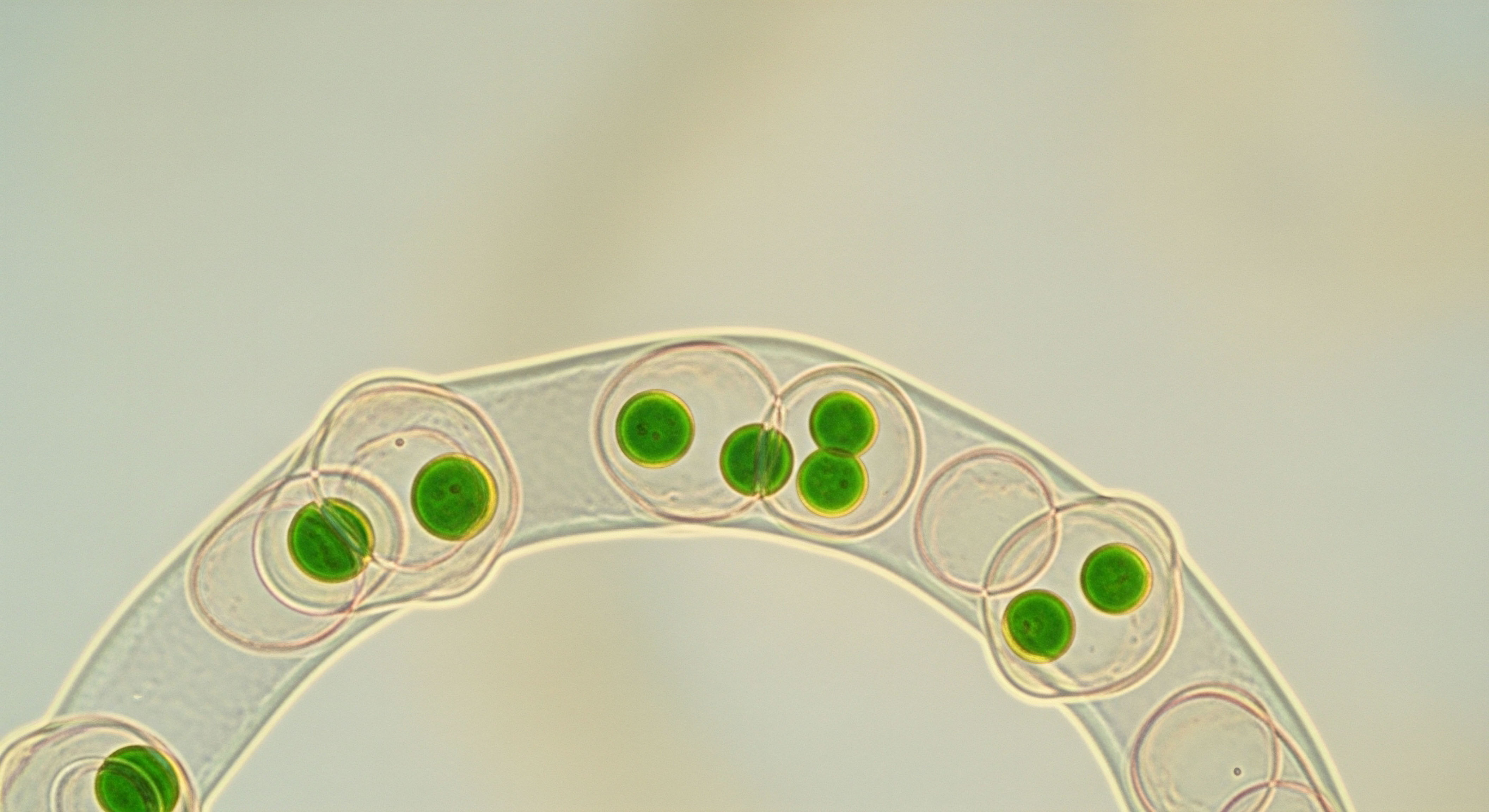

The Unseen Blueprint of Night
The pursuit of peak human performance often focuses on the waking hours ∞ rigorous training, precision nutrition, and intense cognitive demands. Yet, the true architects of our biological superiority operate in silence, under the cover of darkness. The night represents far more than mere respite; it is the dedicated workshop where the body undergoes its most profound and transformative processes.
Here, cellular repair protocols activate, hormonal symphonies orchestrate, and neural networks consolidate the day’s learning, preparing the system for its next demanding cycle. This nightly reconstruction is not a passive state. It represents an active, intricate recalibration of every biological system, setting the stage for optimal vitality and sustained high performance.
Our endocrine system, a master regulator of physiological function, operates on precise circadian rhythms. Key anabolic hormones, growth hormone (GH) and testosterone among them, exhibit pulsatile release patterns, with their most significant surges occurring during specific sleep stages. Growth hormone, for instance, reaches its zenith in the early phases of deep sleep, driving tissue repair, fat metabolism, and cellular regeneration.
This nightly surge supports muscle protein synthesis and bone density, crucial elements for physical resilience. Similarly, testosterone production peaks during the early morning hours, influencing mood, cognitive drive, and metabolic health. A disruption in these finely tuned rhythms directly impacts our capacity for physical output and mental acuity.
Sleep deprivation, even for a single night, can decrease natural killer cell activity by as much as 70%, compromising immune defense and recovery pathways.
The brain, a central processing unit for our entire existence, uses nocturnal periods for critical maintenance. Glymphatic system activity, responsible for clearing metabolic waste products from the brain, intensifies during sleep. This includes the removal of amyloid-beta proteins, whose accumulation links to neurodegenerative decline.
Sleep also consolidates memories, transferring information from temporary hippocampal storage to long-term cortical archives. This neural housekeeping optimizes cognitive function, ensuring mental sharpness and adaptability for the following day. Ignoring this fundamental biological imperative risks systemic decay, eroding the very foundations of health and performance.

Cellular Recalibration and Hormonal Mastery
The concept of a “Nightly Architect” frames sleep as a deliberate, programmed process of biological upgrade. It acknowledges the body’s innate intelligence to optimize its own functions when provided with the correct inputs and environment. This involves more than simply closing your eyes.
It demands a strategic approach to evening routines, nutrition, and environmental control to facilitate these crucial nocturnal operations. Understanding the precise mechanisms at play allows us to intentionally influence these processes, moving beyond conventional rest into a realm of proactive biological superiority.
Consider the impact on cellular longevity. Telomere length, a biomarker of cellular aging, correlates directly with sleep quality and duration. Chronic sleep disruption accelerates telomere shortening, suggesting a direct link between suboptimal nightly recovery and hastened biological aging. The nightly cycle presents an opportunity to reverse or slow this decline, fortifying cellular structures and extending the functional lifespan of our tissues. This extends beyond simple aesthetics, impacting organ function, immune response, and overall systemic robustness.
- Hormone Pulsatility ∞ Optimizing deep sleep stages enhances the natural secretion of growth hormone and testosterone.
- Glymphatic Clearance ∞ Deep sleep facilitates the brain’s waste removal, protecting cognitive function.
- Cellular Repair ∞ Nighttime processes mend cellular damage and promote tissue regeneration.
- Immune Fortification ∞ Restful sleep strengthens the body’s defenses against pathogens and inflammation.
- Memory Consolidation ∞ Neural networks organize and store information, enhancing learning and recall.


Precision Protocols for Nocturnal Optimization
Mastering the night requires a meticulous approach, integrating advanced understanding of endocrinology and neuroscience with practical, actionable strategies. This involves a systems-engineering perspective, viewing the body as a high-performance machine with specific tuning requirements for optimal nocturnal operation. We move beyond general wellness advice into targeted interventions designed to amplify the body’s inherent regenerative capabilities. This involves manipulating environmental cues, leveraging specific compounds, and structuring the evening for maximal physiological benefit.

Environmental Calibration for Deep Rest
The immediate surroundings profoundly influence sleep architecture. Light exposure, particularly blue light from screens, disrupts melatonin production, the primary hormone signaling sleep onset. Implementing a strict “digital sunset” at least two hours before bed allows for natural melatonin synthesis.
Temperature also plays a pivotal role; a cooler ambient environment, typically between 60-67°F (15-19°C), facilitates the body’s natural drop in core temperature, a prerequisite for initiating and maintaining deep sleep. Sound, even at low levels, can fragment sleep, reducing time spent in restorative stages. Creating a sanctuary free from auditory and visual disturbances is a foundational step in commanding the night.
Nutrition also dictates the quality of nocturnal recovery. A strategic evening meal, rich in complex carbohydrates and lean protein, supports stable blood glucose levels throughout the night, preventing cortisol spikes that can awaken the system. Magnesium, an essential mineral, acts as a natural muscle relaxant and supports GABAergic neurotransmission, promoting calm. Zinc plays a role in melatonin metabolism and sleep regulation. Targeted supplementation with these minerals, or their precursors, provides a biological advantage.
A study published in the Journal of Clinical Endocrinology & Metabolism revealed that chronic sleep restriction (5 hours per night) can decrease testosterone levels by 10-15% in young, healthy men within a single week.

Hormone and Peptide Modulations
For individuals seeking to elevate their biological potential, targeted hormone and peptide therapies offer a powerful means to enhance nightly repair processes. Testosterone Replacement Therapy (TRT), when clinically indicated, restores physiological levels of this vital hormone, supporting muscle mass, bone density, and metabolic function, all of which benefit from optimized nocturnal recovery. The timing and dosing of such therapies require precise clinical oversight, ensuring alignment with the body’s natural rhythms.
Peptide science offers specific signaling molecules that can orchestrate more efficient repair. Growth Hormone-Releasing Peptides (GHRPs) such as GHRP-2 or Ipamorelin, or Growth Hormone-Releasing Hormones (GHRHs) like Sermorelin, stimulate the pulsatile release of endogenous growth hormone. These compounds enhance the natural nocturnal GH surge, intensifying cellular regeneration, fat oxidation, and tissue repair.
These interventions represent a strategic partnership with the body’s intrinsic mechanisms, not an override. Their application requires a deep understanding of individual physiology and a personalized approach, always under expert guidance.
| Optimization Lever | Action | Biological Impact |
|---|---|---|
| Digital Sunset | Avoid screens 2 hours pre-sleep | Preserves melatonin production, promotes sleep onset |
| Thermal Regulation | Cool bedroom (60-67°F) | Facilitates core body temperature drop, enhances deep sleep |
| Strategic Nutrition | Complex carbs, lean protein evening meal | Stabilizes blood glucose, prevents nocturnal cortisol spikes |
| Magnesium/Zinc | Targeted supplementation | Supports GABA, melatonin metabolism, muscle relaxation |
| GHRPs/GHRHs | Clinically guided peptide use | Amplifies endogenous growth hormone release, boosts repair |


The Future of Regenerative Existence
The commitment to nightly biological superiority transforms the very definition of aging. It reframes the passage of time not as an inevitable decline, but as an ongoing opportunity for strategic enhancement. This proactive stance on longevity extends beyond simply living longer; it promises a life lived with sustained vigor, cognitive sharpness, and physical resilience.
The application of these protocols represents an investment in a future where peak performance becomes a consistent state, where age is merely a number defining experience, not a limitation on capability.

Sustained Vigor and Cognitive Edge
Implementing these nightly strategies yields tangible returns across multiple dimensions of human experience. Athletes report accelerated recovery times, allowing for more intense training and faster adaptation. Executives experience heightened cognitive function, improved decision-making, and enhanced emotional regulation, navigating high-stress environments with greater ease.
Individuals observe improved body composition, with enhanced fat loss and muscle retention, alongside a profound sense of vitality that permeates their daily lives. The consistent application of these principles sculpts a more resilient, capable, and optimized self.
The timeline for experiencing these benefits varies with individual physiology and adherence to protocols. Initial improvements in sleep quality and subjective well-being often manifest within weeks. More profound changes in body composition, hormonal markers, and cognitive performance become evident over several months of consistent, data-driven application.
This journey is one of continuous calibration, guided by objective biomarkers and subjective experience, always aiming for an upward trajectory of biological excellence. It represents a paradigm shift from reactive symptom management to proactive, pre-emptive optimization.

Redefining Longevity through Nightly Command
This approach fundamentally redefines our relationship with aging. It challenges the passive acceptance of age-related decline, replacing it with a strategic imperative for continuous optimization. The Nightly Architect of Biological Superiority provides a framework for not just extending lifespan, but expanding healthspan ∞ the period of life lived in full function and vitality. This vision extends to mitigating the chronic diseases associated with aging, by maintaining robust cellular health, hormonal balance, and neurocognitive integrity.
The future belongs to those who master their internal systems, recognizing the profound power of the night. It is a future where individuals actively design their biological destiny, rather than passively observing it. The knowledge and tools for this transformation exist today, ready for those prepared to command their physiology with precision and purpose. This is the new frontier of human potential, forged in the silent, restorative hours of darkness.

The Relentless Pursuit of Biological Excellence
The human body represents a masterpiece of engineering, a complex system designed for adaptation and resilience. Our role as Vitality Architects involves understanding its intricate mechanisms and applying precise, evidence-based interventions to elevate its inherent capabilities. The nightly processes of repair, regeneration, and hormonal orchestration form the bedrock of this elevation.
To ignore this fundamental truth means leaving vast reserves of potential untapped, surrendering to the entropy of time rather than asserting mastery over it. This pursuit of biological excellence is not a trend; it represents an immutable truth in the quest for a life lived at its absolute peak. Every dawn brings the opportunity to experience the dividends of a night meticulously optimized, a body and mind honed for superior performance and an extended, vibrant healthspan.



